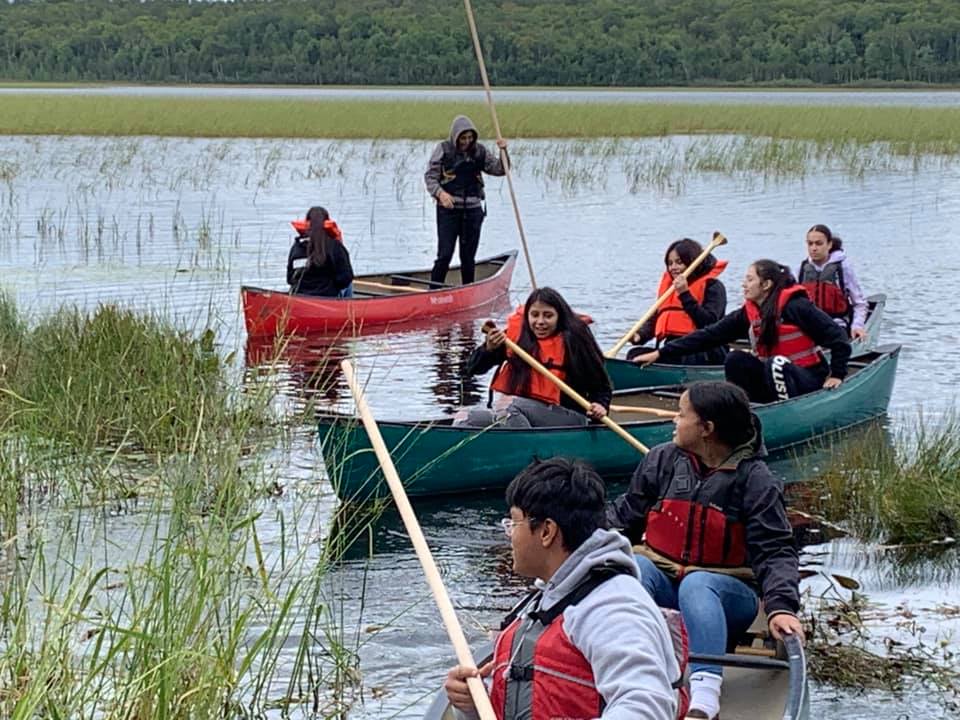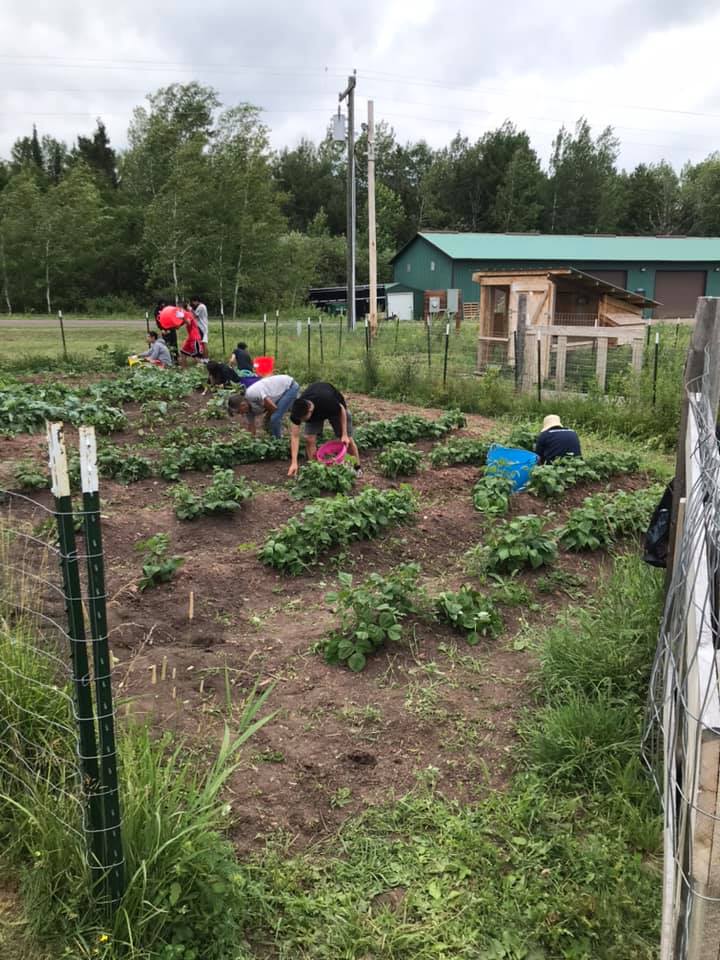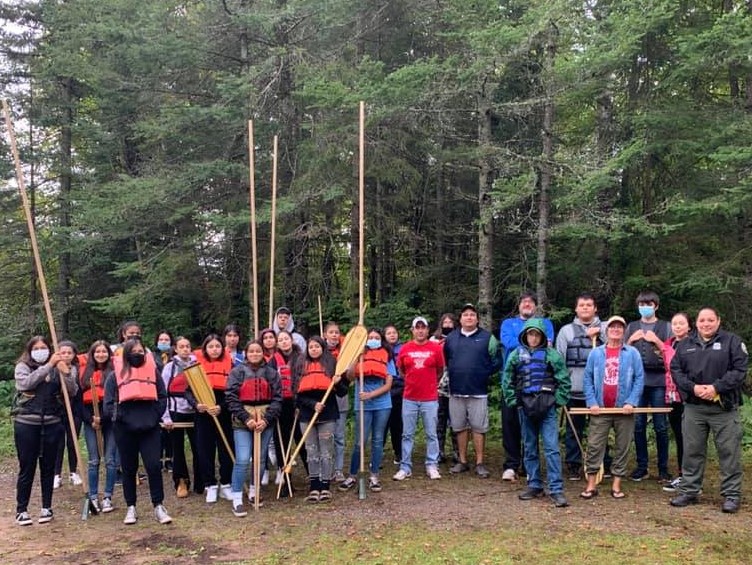Outdated or Unsupported Browser Detected
DWD's website uses the latest technology. This makes our site faster and easier to use across all devices. Unfortunatley, your browser is out of date and is not supported. An update is not required, but it is strongly recommended to improve your browsing experience. To update Internet Explorer to Microsoft Edge visit their website.
November 26, 2021

ODANAH, WI – Laura Miranda's son had no idea what a job interview was or why he would want to work during the summer; but once he started working, she noticed a change in his behavior.
"He seemed more motivated to engage in different types of events such as family time and outdoor activities," said Miranda, a vault department manager at the Bad River Lodge and Casino.
Miranda's son is one of more than 120 high school students who have participated in a collaborative summer youth program hosted by the Bad River Band of Lake Superior Chippewa, Red Cliff Band of Lake Superior Chippewa, Wisconsin Department of Workforce Development's Division of Vocational Rehabilitation, and the Great Lakes Inter-Tribal Council (GLITC) Vocational Rehabilitation for Native Americans (VRNA) program. In consultation with tribal leaders, the youth program offers high school students paid positions in areas such as lawn care, office clerical work, and maintenance, among others.
"The program is a great opportunity for our youth," Miranda said. "They are learning about teamwork and working environments and are developing skills to help them as they prepare for adulthood."
During its first year in 2018, the program served 39 high school students living on or near the two reservations. In 2019, 59 students participated in the program and in 2020, 43 took part in the Bad River youth program. Despite the global pandemic, Bad River safely implemented health protocols and saw a jump to 53 student participants in the summer of 2021. Red Cliff Tribe did not participate in 2020 or 2021 due to COVID-19.
"The Bad River-DVR/VRNA partnership offered Bad River youth a unique opportunity to learn job skills through culturally responsive summer youth programming in their own community," said Dee Gokee-Rindal, human resources and tribal operations manager for the Bad River Band of Lake Superior Chippewa. "It was an exceptional learning experience which actually empowered youth to make more informed choices about their educational and career options. Feedback from students was overwhelmingly positive.”

During the 2021 program, participants were exposed to many opportunities around Bad River. Summer program participants worked with the maintenance department to prepare cabins in Amnicon Bay, helped at the local cemetery, and fulfilled daily requests from different tribal departments. They also worked in a grocery store, learning meat cutting and wrapping, business accounting, ordering, and stocking.
Beyond learning valuable individual lessons, their work supported the whole tribe. Student participants helped plan a 15K bike ride event, harvested and processed berries for jam, and gathered medicines for their neighbors in need on the reservation. Program participants were offered work experiences in Bad River Tribe's legal department where they learned about treaty law and conducted mock trials.
“The experience has been great, and we are glad to have the opportunity to collaborate with the Wisconsin Department of Workforce Development, VRNA, Ashland CEP, and GLITC-VRNA programs to bring such a wonderful youth employment program to Red Cliff and the community," said Nathan Gordon, Red Cliff vice chairman. "Having a program for our youth here in Red Cliff is a needed thing as employment opportunities in this area are scarce and have declined over the years for youth.”
Mary Kaulaity-Nelis, a parent of two program participants, also saw a positive change in her sons as a result of the summer youth program.
"They mentioned how much fun they had with staff and the projects they worked on," she said.
One son didn't realize how much fun he would have cutting lawns for elders. "He even thought about starting his own business one day in landscaping, which was exciting to hear," Kaulaity-Nelis said. Her other son worked with the art crew and, "he didn't know all the stuff he could do with art and stuff just around the house."
"I hope this program continues for our youth," Kaulaity-Nelis said. "It would be nice to see this program throughout the year, if possible, not just for the four weeks it is offered in the summertime."
The summer youth program is just one of the many collaborations between DWD and Wisconsin's Native American tribes. For over 21 years, the collaboration has provided education and support programming that has resulted in increased employment, economic independence, and self-sufficiency.

Beginning in the 1990s, cultural conferences were offered to DVR employees by Native American leaders and grants spurred several vocational programs with tribal employers. By the late '90s, three American Indian Vocational Rehabilitation programs were funded in Wisconsin to provide vocational rehabilitation services to Native Americans living on, or near, their reservations. Full-time tribal vocational rehabilitation staff were designated for Oneida Nation, GLITC, and Lac Courte Oreilles Band of Lake Superior Chippewa (LCO), and soon after, tribal and DVR leaders began annual joint training events to build capacity and collaboration to better serve Native Americans in Wisconsin. DVR then assigned specific counselors to each tribe, resulting in regular DVR office hours on reservations.
As a result of these and other collaborative efforts, Wisconsin has increased participation in tribal employment programs, holding events such as annual career and community resource fairs, monthly virtual meetings between VRNA and DVR counselors, and bi-weekly visits with DVR staff at Red Cliff and Bad River Reservations. Service and participation with Native American youth and adults has also increased through DVR training grants and the summer youth program.
"The partnership between DVR and tribal leaders around Wisconsin has consistently grown over the past two decades," said Tom Draghi, DVR director serving Northwest Wisconsin and tribal relations coordinator for DVR. "We have seen a positive increase in employment outcomes within the tribes and our relationship only continues to grow as we bounce back from the global pandemic."
Wisconsin's Department of Workforce Development efficiently delivers effective and inclusive services to meet Wisconsin's diverse workforce needs now and for the future. The department advocates for and invests in the protection and economic advancement of all Wisconsin workers, employers and job seekers through six divisions – Employment and Training, Vocational Rehabilitation, Unemployment Insurance, Equal Rights, Worker's Compensation and Administrative Services. To keep up with DWD announcements and information, sign up for news releases here and follow us on Facebook, Twitter, LinkedIn and Instagram.